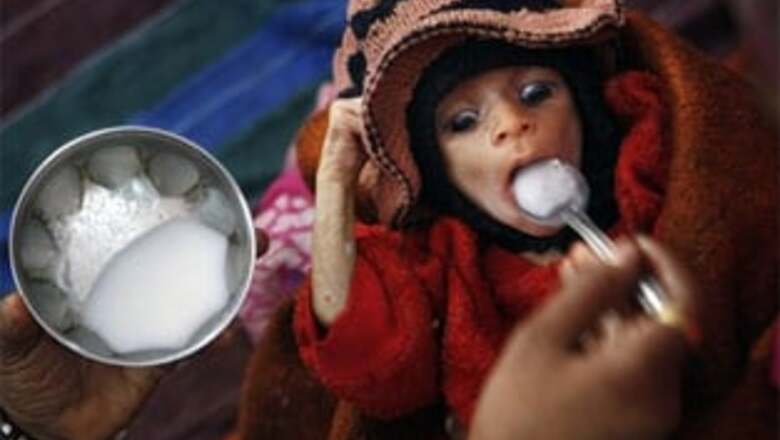
views
New Delhi: International charity Save the Children on Tuesday said an extra 10 million children are now malnourished because of the global rise in food prices and asked the G20 leaders to keep them in mind while taking decisions.
An additional 400,000 children could die by the end of the year as a result of the global financial collapse, Save the Children said in a statement.
The international charity warned that millions of children could go hungry due to the impact of the credit crunch on developing countries, combined with continuing high food prices, which meant that the world's poorest families cannot feed their children properly.
"The biggest impact of this global economic slowdown is on children in the poorest countries," said Shireen Vakil Miller, Save the Children's director of advocacy and policy.
"More malnutrition means more needless child deaths and more children growing up with poorly developed brains and bodies. The impact of food prices has already set back the limited progress that has been made to tackle child malnutrition, and the financial crisis means even more children will go hungry," Miller said.
According to the agency's statistics, around 3.5 million children die in a year because of malnutrition. In India alone, one million children's lives could be saved every year if they were not malnourished. The economic global downturn could kill another 2.8 million more children around the world before 2015; the target set by many of the G20 leaders to eradicate extreme poverty and hunger around the world as part of the millennium development goals.
"Leaders of the richest countries meeting this week in London must look beyond their own backyard and understand that the crisis that they have helped create will not only damage livelihoods in their own countries, it will destroy lives in the rest of the world," Miller stressed.
She said that a global economic recovery plan will not succeed if the needs of developing and low income countries are not addressed.
Indian organizations are also worried about the fate of food insecurity in the country and lack of funding to support aid initiatives.
"The NGO sector has been deeply affected by the recession. This is likely to percolate to the grass roots, where without funding, the affected will become even more vulnerable," said Radha Khan, who is a member of the Hunger Project, an initiative to improve nutrition and health in 14 states of India.
Amit Sengupta of the Jan Swasthya Abhiyan, an association of over 1,000 organisations working in health care and policy in the country, also voiced similar concerns.
"We are starting with an already vulnerable base of people, anything that could nudge them over - be it food prices or failures in government policy could yield catastrophic results," Sengupta told IANS.
"At the summit, leaders must realize that the measures now, can not be macroeconomic. They must target vulnerable groups," Sengupta added.
Save the Children's research has demonstrated that every five percent reduction in a country's child mortality rate leads to a one percent increase in that country's GDP.
"Data since 1990 in India reflects that government spending on welfare activities that include health, nutrition have progressively come down - in some years exponentially declined. In the meantime the GDP is increasing - projecting false illusions," Sengupta said.
Instead of macroeconomic decisions to bolster the stock markets and statistics of growth, India and other South Asian countries facing similar circumstances need to focus on the affected vulnerable sections, Sengupta stressed.
"Saving a child's life should be an end in itself, but there is also a powerful, recession-busting investment case to be made in spending our money on poor and hungry children," said Miller.
"If G20 leaders put children's lives at the heart of their decisions in London this week, they will be doing the right thing - and doing themselves a favour," she added.




















Comments
0 comment